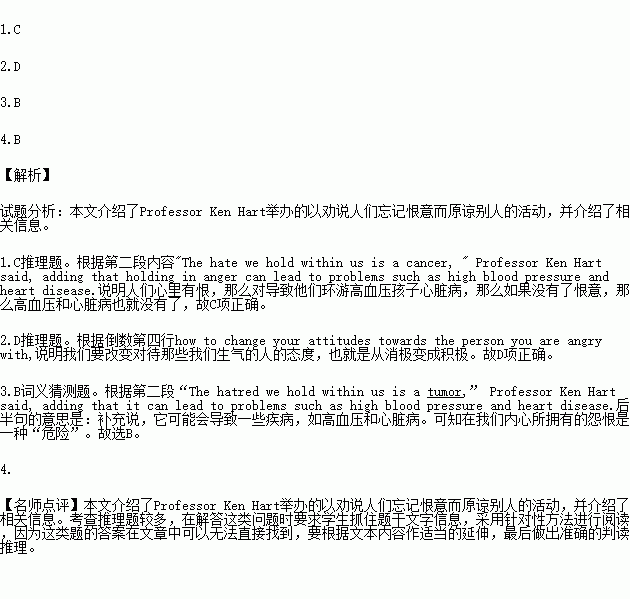题目内容
LEEDS, England—A Leeds University psychology professor is teaching a course to help dozens of Britons forgive their enemies.
“The hatred we hold within us is a tumor,” Professor Ken Hart said, adding that it can lead to problems such as high blood pressure and heart disease.
More than 70 people have become members in Hart’s first 20-week workshop in London—a course he says is the first of its kind in the world.
“These are people who are sick and tired of living with a memory. They realize their bitterness is a poison they think they can pour out, but they end up drinking it themselves,” said Canadian-born Hart.
The students meet in groups of eight to ten for a two-hour workshop with an adviser every fortnight.
The course, ending in July, is expected to get rid of the tumor of hatred in these people. “People have lots of negative attitudes towards forgiveness,” he said, “People confuse forgiveness with forgetting. Forgiveness means changing from a negative attitude to a positive one."
Hart and his team have created instructions to provide the training needed.
“The main idea is to give you guidelines on how to look at various kinds of angers and how they affect you, and how to change your attitudes towards the person you are angry with," said Norman Claringbull, a senior expert on the forgiveness project.
Hart said he believes forgiveness is a skill that can be taught, as these people “want to get free of the past”.
1. From this passage we know that________.
A. high blood pressure and heart disease are caused by hatred
B. high blood pressure can only be cured by psychology professors
C. without hate, people will have less trouble connected with blood and heart
D. people who suffer from blood pressure and heart disease must have many enemies
2.According to the passage, if you are angry with somebody, you should________.
A. have lots of negative attitudes towards him or her
B. never meet him or her again
C. persuade him or her to have a positive talk with you
D. try to build up a positive attitude towards the person
3.What does the underlined word “tumor” probably mean?
A. cancerB. danger C. disease D. influence
4.The author wrote this passage in order to________.
A. persuade us to go to Hart’s workshop
B. tell us the news about Hart’s workshop
C. tell us how to run a workshop like Hart’s
D. help us to look at various kinds of anger
 阅读快车系列答案
阅读快车系列答案
